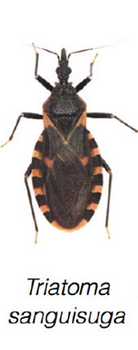![]()

Entomologists from the Nebraska Dept of Agriculture and the University of Nebraska-Lincoln Dept of Entomology last summer identified for the first time in the state a species of kissing bug and a disease-causing parasite it can carry.
Kissing bugs, also known commonly as conenose bugs and chinches, are blood-sucking insects whose bite can transmit the parasite that causes Chagas disease.
Kissing bugs usually feed on blood during the night, when animals or people are asleep or inactive. The bites are often painless and many people do not even realize they have been bitten.
Kissing bugs are found across Mexico, Central, and South America and the Southern United States, especially during the summer months. There are 11 different species in the U-S.
The species now detected in Nebraska is the Eastern blood-sucking conenose, which has been found as far north as Pennsylvania and as far west as Texas. It’s less than an inch long with a blackish, flattened, and elongated body. There are 6 reddish-orange horizontal markings on each side and 4 more on the wings.
Getting Kangas disease from the parasite isn’t common and the risk of infection from the kissing bug species now in Nebraska is very low. Still, about 25% of those who are infected can develop the disease, which is serious and chronic, so experts say early diagnosis is important.
They also say that anyone who has seen kissing bugs in their home or who thinks they may have been bitten by one should talk to their doctor about getting tested for Chagas disease.
